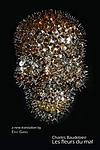Charles Baudelaire
Charles Baudelaire was a French poet, essayist, art critic, and translator of the 19th century. He is best known for his collection of poems 'Les Fleurs du mal' (The Flowers of Evil), which expresses the complexities of modern urban life and delves into themes of beauty, decadence, and eroticism. His work had a significant influence on the symbolist and modernist movements, and he is often regarded as a pioneer of literary modernism.
Books
This list of books are ONLY the books that have been ranked on the lists that are aggregated on this site. This is not a comprehensive list of all books by this author.
-
1. The Flowers of Evil
"The Flowers of Evil" is a collection of poems that explore themes of decadence and eroticism, and the changing nature of beauty in the rapidly industrializing Paris during the 19th century. The work is renowned for its exploration of the paradoxes of pleasure and pain, the exotic and the commonplace, and the boundaries of morality and aesthetics. The poems challenge traditional notions of good and evil, suggesting that beauty can be found in unexpected and even disturbing places.
-
2. Paris Spleen
The book is a seminal work in the history of prose poetry, capturing the modern urban experience through a series of short, lyrical pieces. It delves into the psychological landscape of the city, exploring themes of melancholy, ennui, and the search for beauty amidst the squalor of Parisian life in the mid-19th century. The author's sharp observations and vivid imagery reflect his complex relationship with the city, oscillating between a deep love for its vibrant culture and a profound sense of alienation. This collection of prose poems is considered a touchstone for modernist literature, influencing generations of writers and poets with its innovative style and introspective depth.
-
3. The Painter Of Modern Life
"The Painter of Modern Life" is a seminal essay that explores the concept of beauty in the rapidly changing urban landscape of the 19th century. The author delves into the life and work of an artist who captures the fleeting, ephemeral experiences of modernity, arguing that the true artist must extract the eternal from the transitory. Through a series of observations and critiques, the essay celebrates the vibrancy of city life, the fashion of the day, and the character of the modern individual, while also examining the role of the artist as a detached but deeply perceptive chronicler of the contemporary world. The work is a philosophical treatise on aesthetics that has influenced both the understanding of modernism in art and the broader cultural perception of modern life.
-
4. Le Spleen De Paris
"Le Spleen de Paris" is a collection of prose poems that delve into the complexities of urban life in 19th-century Paris. The work captures the melancholic atmosphere of the city, exploring themes of existential angst, ennui, and the search for meaning amidst the backdrop of modernity. Through vivid imagery and introspective musings, the poems reflect on the solitary experiences of individuals in the bustling metropolis, often highlighting the contrast between the transient beauty of the urban landscape and the profound isolation felt by its inhabitants. The collection is renowned for its innovative use of prose poetry, which blends poetic lyricism with the freedom of prose, and is considered a seminal work that prefigures the symbolist and modernist literary movements.



